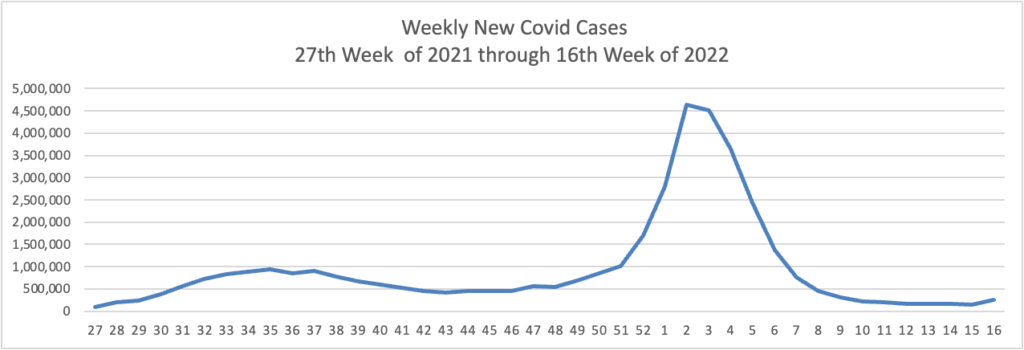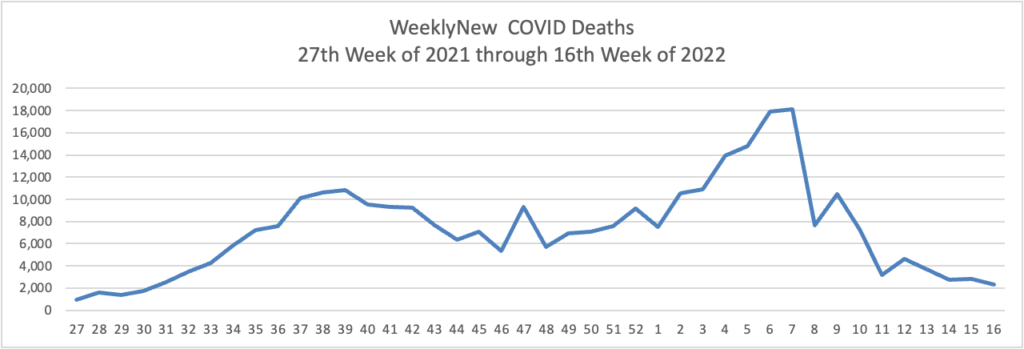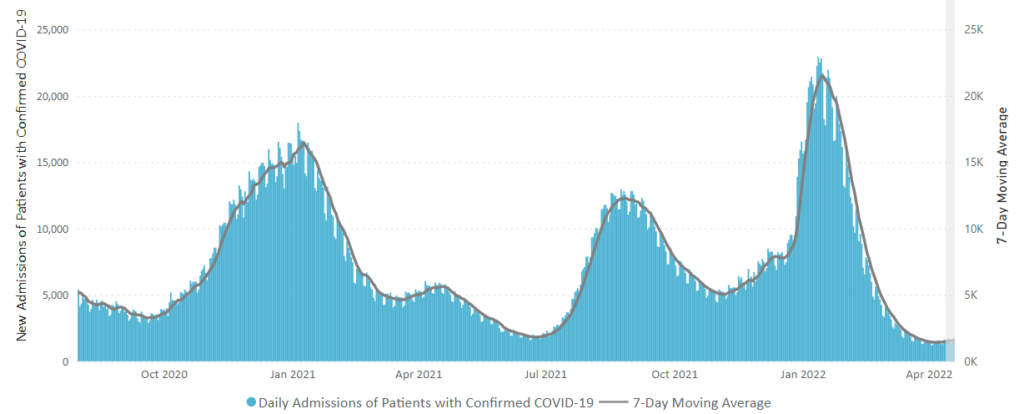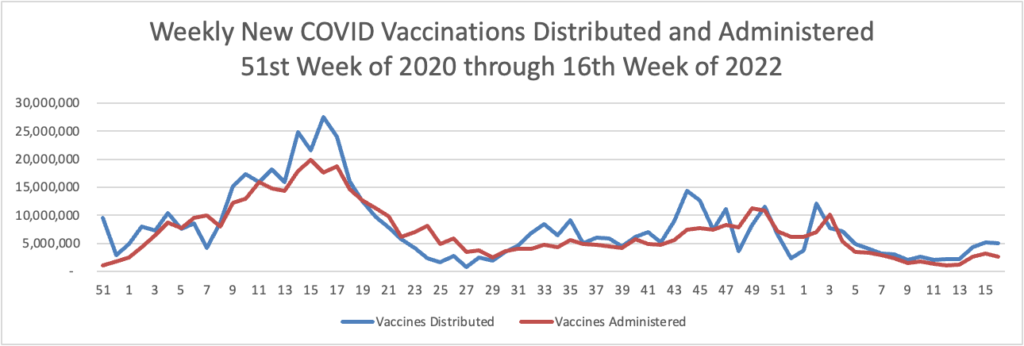Based on the Centers for Disease Control’s Covid Data Tracker and using Thursday as the first day of the week, here are the FEHBlog’s latest weekly charts of new Covid cases and deaths.


Because David Leonhardt in the New York Times recommends keeping an eye on Covid hospital admissions here is the CDC’s latest chart

The weekly new cases and death chart start in the middle of 2021 when we hit all time lows in new cases. Although our new cases total for the past week was 3 times week 27 in 2021, the new hospitalizations level is lower. That’s good news.
The CDC’s weekly review of its Covid stats adds
Currently, there are 39 (1.21%) counties, districts, or territories with a high COVID-19 Community Level, 231 (7.17%) counties with a medium Community Level, and 2,954 (91.63%) counties with a low Community Level. This represents a slight (0.78%) increase in the number of high-level counties, a small (+1.67%) increase in the number of medium-level counties, and a corresponding (−2.45%) decrease in the number of low-level counties. Twenty-five (44.64%) of 56 jurisdictions had no high- or medium-level counties this week.
To check your COVID-19 community level, visit COVID Data Tracker.
Here’s the FEHBlog’s latest weekly chart of Covid vaccinations distributed and administer from the beginning of the COVID vaccination era to the 16th week of 2022.

New vaccinations remain above 2 million per week.
From the Medicare front, the Centers for Medicare Services announced today a proposed rule that would create five new special Medicare enrollment periods.
- An SEP for Individuals Impacted by an Emergency or Disaster that would allow CMS to provide relief to those beneficiaries who missed an enrollment opportunity because they were impacted by a disaster or other emergency as declared by a Federal, state, or local government entity.
- An SEP for Health Plan or Employer Error that would provide relief in instances where an individual can demonstrate that their employer or health plan materially misrepresented information related to enrolling in Medicare timely.
- An SEP for Formerly Incarcerated Individuals that would allow individuals to enroll following their release from correctional facilities.
- An SEP to Coordinate with Termination of Medicaid Coverage that would allow individuals to enroll after termination of Medicaid eligibility.
- An SEP for Other Exceptional Conditions that would, on a case-by-case basis, grant an enrollment period to an individual when circumstances beyond the individual’s control prevented them from enrolling during the IEP, GEP or other SEPs.
These “SEPs that would provide individuals who meet certain exceptional conditions and who missed a Medicare enrollment period an opportunity to enroll without having to wait for the GEP and without being subject to a [Part B] late enrollment penalty.”
From the healthcare business front —
Beckers Payer Issues tells us
UnitedHealth Group subsidiary Optum has quietly acquired at least two independent primary care groups in Oregon, according to The Lund Report.
Optum has purchased Eugene-based Oregon Medical Group and Portland-based GreenField Health. Combined, the two systems have about 120 doctors and clinicians at 11 facilities.
GreenField Health was purchased last year and Oregon Medical Group in late 2020, according to the Lund Report.
Nationwide, UnitedHealth Group has purchased about 1,500 primary care and specialty facilities, totaling 60,000 physicians.
Fierce Healthcare informs us
Humana will divest its majority stake in Kindred at Home’s hospice business to investment firm Clayton, Dubilier & Rice.
As part of the deal, which was announced Thursday, Humana will sell off a 60% stake in KAH Hospice for $2.8 billion in cash, which reflects an enterprise valuation of $3.4 billion and twelve times the division’s forecasted earnings before interest, income taxes, depreciation and amortization (EBITDA) for this year.
Humana said a year ago when it bought out the majority stake in Kindred at Home that it planned to divest the hospice arm. The insurer believes that it can deliver strong patient outcomes in hospice care without owning KAH Hospice outright, Chief Financial Officer Susan Diamond said in a statement.
From the medical research front, STAT News interviews Helmy Eltoukhy and AmirAli Talasaz, Guardant Health’s founders and co-CEOs.
Bay Area biotech Guardant Health is closer than ever to its ultimate goal — developing and deploying a simple, blood-based test that you could get during an annual doctor’s visit to spot cancer early enough that it might be treated more successfully. And 2022 is shaping up to be a big year for the company’s ambitions.
That’s good news for all of us.
